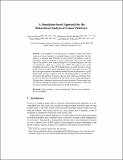A simulation-based approach for the behavioural analysis of cancer pathways
Abstract
Cancer pathway is the name given to a patient’s journey from initial suspicion of cancer through to a confirmed diagnosis and, if applicable, the definition of a treatment plan. Typically, a cancer patient will undergo a series of procedures, which we designate as events, during their cancer care. The initial stage of the pathway, from suspected diagnosis to confirmed diagnosis and start of a treatment is called cancer waiting time (CWT). This paper focuses on the modelling and analysis of the CWT. Health boards are under pressure to ensure that the duration of CWT satisfies predefined targets. In this paper, we first create the visual representation of the pathway obtained from real patient data at a given health board, and then compare it with the standardised pathway considered by the board to find and flag a deviation in the execution of the cancer pathway. Next, we devise a discrete event simulation model for the cancer waiting time pathway. The input data is obtained from historical records of patients. The outcomes from this analysis highlight the pathway bottlenecks and transition times which maybe used to reveal potential improvements for CWT in the future.
Citation
Silvina , A , Redeker , G A , Webber , T & Kuster Filipe Bowles , J 2021 , A simulation-based approach for the behavioural analysis of cancer pathways . in J Bowles , G Broccia & M Nanni (eds) , From data to models and back : 9th International symposium, DataMod 2020, virtual event, October 20, 2020, revised selected papers . Lecture notes in computer science , vol. 12611 , Springer , Cham , pp. 57-71 . https://doi.org/10.1007/978-3-030-70650-0_4
Publication
From data to models and back
ISSN
0302-9743Type
Conference item
Description
Funding: This research is partially supported by the DataLab.Collections
Items in the St Andrews Research Repository are protected by copyright, with all rights reserved, unless otherwise indicated.

